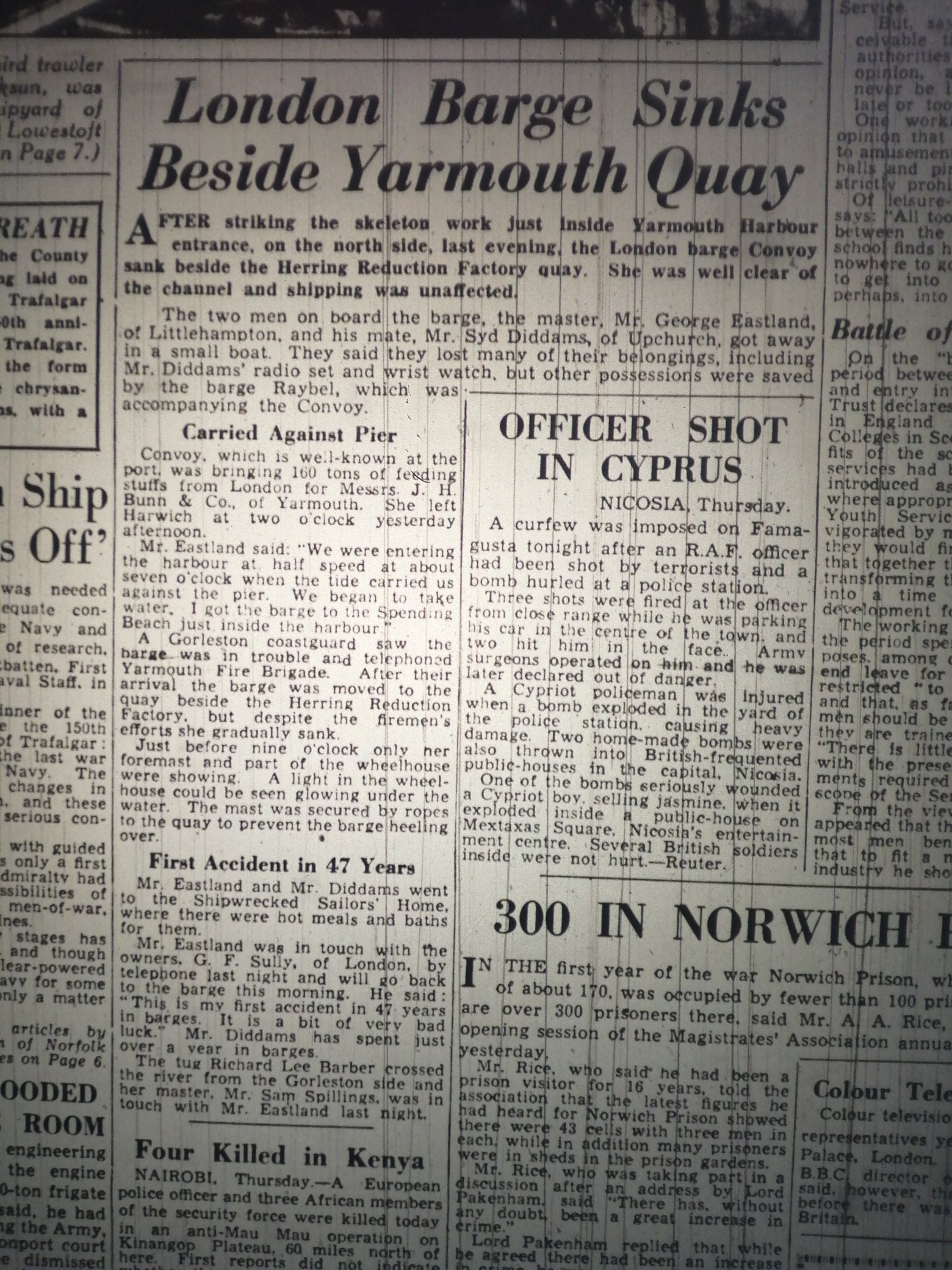Reflections on 2024/3 - Raybel to the rescue
Reflections on 2024 / Part 3
Remembering some of the highlights of last year…
One of the thrills of the Raybel restoration from 2020 to 2024 was the discovery of unexpected links between the history of the barge and of Lloyd’s Wharf, and people who have become involved in the project, often through family. Perhaps none is quite as remarkable as Kevin’s story….
RAYBEL TO THE RESCUE
I became involved in the Raybel restoration project, as a volunteer, in early 2020, just before the outbreak of covid in the UK. My interest had been piqued when friends of my mother suggested that she may be interested to visit Raybel at Milton Creek, where Raybel was originally built, at one of the first open days managed by Raybel Charters.
My mother, June Nethersell, is daughter of the legendary Barge Master, George Eastland, whom I understand had a reputation as being a “hustler” in latter day barging circles, certainly this is how he was described in the book written by Bob Roberts – ‘Coasting Barge Master’. Mum has many stories about how she enjoyed the early years of her life on the sailing barges with my Grandad, stating that George would treat her more like a boy than a girl. He would expect her to take on tasks and responsibilities which, in these risk averse times, would be frowned upon. Mum would say that old George (her description) was a tough task master and hence did not retain ‘mates’ for long which meant she had to take on duties to help sail the barge. It’s difficult to be objective but Mum would often say, and still does today, that George was a tough man but he was a “bloody good bargeman”.
I was newly retired, from Lloyd’s of London, and looking to have some purpose in my retirement years so it was inevitable, given my maternal grandfather’s association with barges, that I would become involved in the Raybel Project. Therefore, I joined a very dedicated band of volunteers under the enthusiastic leadership of Project Manager, Mark Allinson. Also, I think Mum is secretly pleased that I am volunteering in the Raybel Project.
One of the many stories which Mum has shared with me is that Grandad sank one of his barges, the Convoy, in Great Yarmouth harbour. Unfortunately, I had no evidence other than hearsay to research the matter further. I was therefore grateful to Mark when he invited me to meet Richard Walsh when he visited the Raybel restoration in May 2022. Interestingly, members of the Sully family, previous owners of Raybel, were also present. By coincidence, the Convoy was under the ownership of the Sully family when she sank. I had a worthwhile discussion with Richard and the Sully family, the conclusion of which was that Richard helpfully agreed to let me have any information which he had regarding the sinking of the Convoy.
Richard came up trumps when he did indeed confirm that the Convoy sank in Gt. Yarmouth harbour, even providing a couple of photos of the stricken vessel and, most importantly, providing the exact date the Convoy sank – 20th October 1955. This vital piece of evidence enabled me to research the matter further. Little did I know how that research would link my grandfather to Raybel! The next step was to determine whether the sinking was reported in the local press. I am a frequent visitor to Norwich where our daughter, Lois, and her wife, Amy, live with our two wonderful grandchildren. Discussion with Lois and Amy led me to Norwich Library, in the Forum in the centre of Norwich, where archive copies are maintained of Eastern Daily Press Newspapers.
The archivist at Norwich Library was extremely helpful providing me with microfiche copies of the Eastern Daily Press from October 1955. An article entitled ‘London Barge Sinks Beside Yarmouth Quay’ unlocked (pun intended!) the mystery surrounding the sinking of the Convoy and an ironic link to Raybel. The Convoy struck the skeleton work just inside Yarmouth Harbour entrance, on the north side and sank beside the Herring Reduction Factory quay. Thankfully she was clear of the channel and shipping were unaffected. At the time of her sinking the Convoy was carrying 160 tons of feeding stuff from London which had to be removed before the Convoy could be refloated. This was the first accident in 47 years of service my Grandad had on the barges. Thankfully, to my knowledge, he had no further accidents during his career.
My Grandad (of Littlehampton), and his mate Syd Diddams (of Upchurch), got away from the Convoy in a small boat. Unfortunately, they lost many of their belongings but luckily some other possessions were saved, to my amazement, by the crew of Raybel, which was accompanying the Convoy at the time of her sinking. At a personal level, I have a great affinity towards the Raybel project, and, like the many enthusiastic volunteers, keen to ensure that she is restored and once again working for her living, which we all hope will not be in the not too distant future.
Kevin Nethersell
Image: Top - SB Raybel helps out another barge, the Cambria in the 1950s. By this time Raybel has an engine: Cambria has famously remained engineless, to this day. Below - as reported in the Eastern Daily Press from October 1955


